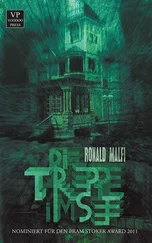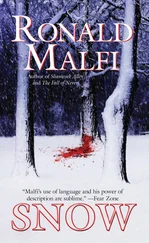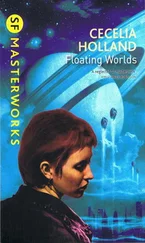
For Darin,
Jonathan,
and Samantha—
The beauty of this mystery . . .
ACKNOWLEDGMENTS
For their input during the writing of this novel, I bow to Kerry Estevez, Juris Jurjevics, Dave Thomas, Don D’Auria, my wonderful editor Lorie Popp, and James Tampa. Thanks also to Adrienne Jones, Robert Dunbar, Greg F. Gifune, Susan Scofield, the good folks at Horror Drive-In and Horrorworld, Diabolical Radio, Pod of Horror, The Funky Werepig, Susan Rosen, and Wendi Winters. And, of course, my friends and family.
Lastly, thanks to all the fans who have sent me e-mails about this book, hungry for the story it tells. You have all warmly embraced this little tale long before it was ever set free in the world.
Thanks. Truly.
—RM
“Because he is my brother, I will suffer a thousand deaths to vindicate his.”
—Alexander Sharpe, The Ocean Serene
“All good writing is swimming under water and holding your breath.”
—F. Scott Fitzgerald,
in an undated letter to his daughter
PART ONE:
THE PURITY OF THE TERRITORY
CHAPTER ONE
It has been said that nature does not know extinction. In effect, it knows only change: nothing ever truly disappears, for there is always something—some part, some particle, some formidable semblance—left behind. You can boil water into vapor, but it hasn’t disappeared. Curiosity killed the cat, but condensation brought it back.
Therefore, such logic should enlighten us to the understanding that if something should happen to develop—should arrive, should become thus, should suddenly appear—then it has always been. Forms evolve and devolve but things always are. There exists no creation and, consequently, no destruction—there exists only transformation. It is a collision of electrons and positrons, this life: the transformation of matter to rays of light, of molecular currents, of water to vapor to water again.
When I was twenty-three, I wrote a novel called The Ocean Serene. It was about a young boy who, having survived a near drowning, has a door of repressed memories opened in his brain, but in truth it was really about my dead brother, Kyle.
I wrote it in the evenings at a small desk in my depressed one-bedroom apartment in the Washington, D.C. neighborhood of Georgetown (across the street from a smattering of university buildings and just a few blocks from where The Exorcist had been filmed many years before). A mug of coffee—black, no sugar—expelled ribbons of steam to one side of my word processor while an ashtray sprouting the flattened, yellowed elbows of cigarette butts sat on the other side. The central air did not always function properly, and I would occasionally crank open the bedroom windows to allow fresh air in. In fact, I remember opening the windows and smoking countless cigarettes and drinking cup after cup after cup of oily coffee more than the actual writing of the manuscript.
I wrote in a fog, in a haze . . . as though a length of gauze had been gently draped over the undulating contours of my brain. After writing the first draft, it took the accumulation of a couple more years and some deep personal reflection before I could once again tackle the manuscript and assemble it into something honest. For whatever reason, I felt this nagging drive to write it as honest as I could. So I wrote the first draft, then tucked it away and busied my mind with other matters until, moons later, I felt I had attained some fraction of personal growth—both in my writing and in the way I interpreted and understood the world—to revisit it. While the story was undeniably an exercise in speculative fiction—a horror novel, in other words—it was as real to me as the memories I carried of my childhood. It was difficult to relive the past. Age brings with it a certain Kryptonite that drains our faith like vampires, and reading the manuscript again almost destroyed me.
But I rewrote and finished it in a fever. It was done, and I couldn’t help but feel relieved. It was tantamount to the spiritual and emotional exhaustion felt after my younger brother’s death. I did not understand why such a thing had eluded me during the writing of the manuscript, but it struck me like a mallet to a gong after finally completing it. And I found I did not know how to feel about what I had just done.
Without combing through the manuscript for typos and inconsistencies, I sent it to the acquisitions editor of a small specialty press with whom I had maintained a formal yet consistent dialogue over the past several months. While I waited to hear from him, I began to doubt myself—not the book, just myself—and wondered if I’d done the right thing in writing the book. I couldn’t tell if I’d commemorated the memory of my younger brother or if I’d cheapened it, ruined it, made it a circus accessible to anyone willing to pay the price of admission.
Weeks later, during an onslaught of rainy weather so violent and unrelenting it seemed the world was preparing to end, the editor informed me that the book had been accepted for publication. He had a few changes, but he said it was a good, strong story written in a good, strong, lucid voice. The book was slated for a hardcover release in the fall.
“One question,” said the editor.
“Yes?”
“Alexander Sharpe?” It was the nom de plume I’d used on the cover page of the manuscript. “Since when have you decided to use a pseudonym?”
Over the phone, I tried to sound as casual as possible. “Wanted to see if Mr. Sharpe would have better luck in the publishing department than I’ve had. I guess he does.”
But that wasn’t the truth.
I couldn’t tell him that I needed to distance myself from it while at the same time I also needed to embrace it. It would make no sense. To me, it seemed a stranger was better prepared to introduce my dead brother’s story to the world than I was. A nonexistent stranger at that. Because I was biased. Because I could not detach myself from it, and to not detach myself from it would be to corrupt the story’s honesty into loathsome self-pity. And I would not allow that to happen.
Because all good books are honest books.
I celebrated with friends, who bought me shots of gasohol and tried to get me laid despite my recent (though undisclosed) intention to finally propose to my longtime girlfriend, Jodie Morgan, and then I celebrated alone with a full pack of cigarettes, a flask of Wild Turkey, and a stroll around Georgetown. Perhaps out of a need for affirmation, I found myself outside one of the neighborhood bars in D.C., punching numbers on a pay phone. It rang several times before my older brother, Adam, picked up.
“I think I just wrote a book about Kyle,” I said, drunk, into the receiver.
“Well, it’s about goddamn time, bud,” Adam said, and I felt myself grow wings and lift off the pavement.
On occasion I found my mind sliding back to that late autumn when I sat and smoked and wrote about my younger brother’s death. I remembered the change of seasons predicated by the changes of the leaves in the trees; the windswept, rain-soaked nights that smelled swampy and full of promise; the retinal fatigue suffered from hours of staring at the throbbing glow of my monitor. It was the only thing I’d ever written that caused me to suffer from sleepless exhaustion. I roved with the flair of a zombie through the streets late at night and subsisted in a state of near catatonia while at my day job as a copy editor for The Washington Post (making just enough money to stave off my landlord while maintaining a sufficient stockpile of ramen noodles and National Bohemian).
Читать дальше










